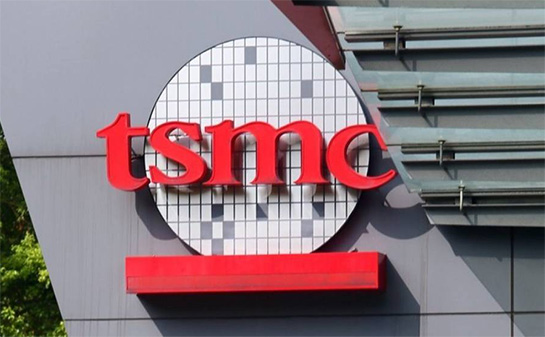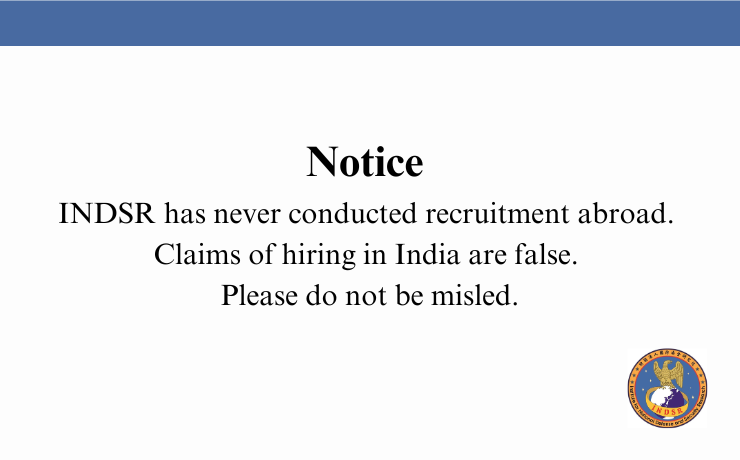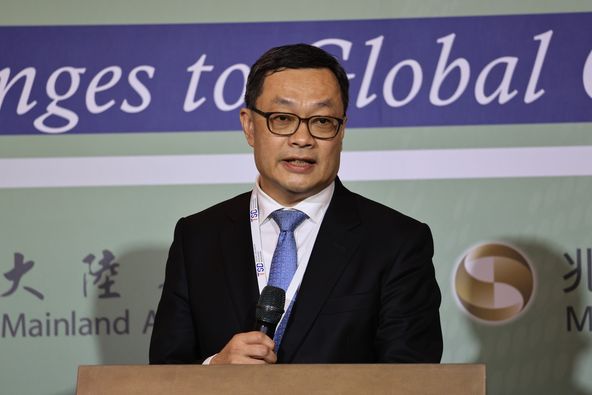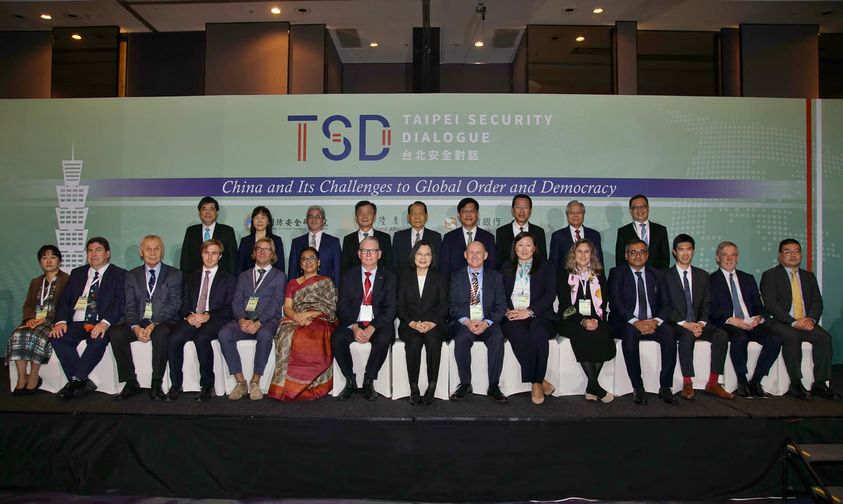Taiwan, INDOPACOM, and the Future of the Global Order
The Institute for National Defense and Security Research hosted Lt Gen Wallace “Chip” Gregson Jr (Ret) for a public lecture on 21 August 2019 to discuss the fundamental values that underpin a “free and open” Indo-Pacific region and put into a security context current events going on in the region.
The following is Mr Gregson’s speech as delivered:
Taiwan, INDOPACOM, and the Future of the Global Order
The security climate for Taiwan declines, and with it that of the INDOPACOM region. The Global Order, the Global Operating System created in the wake of World War II, the system that got us through the existential struggle of the Cold War without another great power conflict, is under pressure.
Taiwan grew and prospered within the open, rules-based, market-oriented international order developed by the United States and our allies in the wake of World War II. This global order and our alliance systems provided a security shield protecting political life and economic growth. Within this security shield, Taiwan became a robust, vibrant, prosperous democracy.
But now the skies are darkening. Democracy spread around the world during the Cold War and accelerated after the Soviet collapse. More recently, crises of confidence in many countries over economic inequality, loss of personal status, changes in the workspace and other factors are taking us in the other direction. “Free” countries are declining. Authoritarianism is coming back, and perhaps we’re seeing a “springtime for autocrats”.
Free and open global trade, another hallmark of the Global Order, is not immune. The last three viable candidates for president of the United States in 2016 felt compelled to come out against trade in general and the Trans-Pacific Partnership in particular. Much of the electorate blamed “trade” for their stagnant or declining wages. We backed out of our own proposal, the Trans-Pacific Partnership. Dueling tariffs and economic uncertainty have been common since 2017.
In 2015 China declared “undisputed historical sovereignty over the entire South China Sea” and its islands, banks, shoals and surrounding waters. They quickly acted on these claims and dredged tons of life-sustaining coral from the sea to build garrisons on semi-submerged features. President Xi met President Obama in Sunnyland California and promised he would not militarize these features. It was a “wall of sand” in the words of Admiral Harris. But long runways, deep water piers and weapons were added. It’s now a wall of SAMs – Surface-to-air-missiles – according to Admiral Davidson. China hacked our government computer systems and compromised the identities of more than 20 Million Americans connected to the U.S. government. New weapons systems were rolled out, along with boasts of being able to kill Guam.
Elsewhere in the region and beyond, Chinese military aircraft and Maritime Militia vessels routinely pressure nations in the East China Sea. Aerial intrusions of Japanese airspace are at Cold War high levels. Political warfare, economic coercion, corruption, disinformation, and other efforts of the United Front Work Department work to expand China’s reach at the expense of other nation’s interests.
Xi Jinping assumed leadership of the Chinese Communist Party and China with a conviction that he had to be “Redder than the Reddest” to rid the CCP of corruption and save the Communist Party. He re-centralized authority in Beijing, ended collective leadership, locked up party critics and purged many senior officers from the military and political hierarchy. Recently he abolished term limits, effectively assuming lifetime tenure at the top of the Party. In a major speech this past January, he solidly linked the unification of Taiwan to a signature theme: the great rejuvenation of the Chinese nation. The intent seems clear.
In this volatile mix of problems, Hong Kong looks like a burning fuse. The camouflage that Hong Kong could be an economic city where politics remained somehow suspended in pursuit of business has been brutally rubbished. We’re 12 or more weeks into this crisis, and counting, with more than a quarter of the city’s residents in the streets and the airport to protest Chinese influence. It started with a proposed extradition law, but it’s well beyond that now. It’s a popular revolt against the Hong Kong government, and Chinese rule. PLA and Peoples Armed Police forces conduct regular demonstrations intended to intimidate the demonstrators. Fierce denunciations and accusations are common.
Xi Jinping’s prestige is at stake, as well as his continued rule. Even autocratic leaders must worry about their core supporters, but one who has purged so many, and did away with succession, has likely made many enemies. They are quiet for now, but for how long? The pressure is on Xi to act. Meanwhile, the people of Hong Kong seem ever more determined to press their case. Hong Kong’s seamless access to Western markets, its strong and legitimate banking sector, a stock market valuation nearly as high as China’s, and solid contract law practices are too valuable for China to easily discard, especially given internal economic issues. China needs Hong Kong commercially, now more than ever. But, the CCP well remembers how civil unrest and resistance can spread. It’s hard to see how this ends well. The question seems to be whether this will be Tiananmen II, or something like Hungary in 1956 and Prague in 1968, or – optimistically - Berlin in November 1989 when the wall fell. However this ends, there will be no return to the status quo ante. Meanwhile, with rare exception, the nations of the world look on, seemingly paralyzed by lack of comprehension or lack of any viable options.
At this unsettling moment how does Taiwan assure its security?
Taiwan’s fundamental security threat is political and coercive, with the PLA always present to show menace and intimidation. Taiwan’s strong military deterrence, backed by adept policy, is essential to resist this. Strong military deterrence provides the security shield to allow economic and political action to counter Chinese coercion.
Fortunately Taiwan has some advantages. The terrain is favorable, with magnificent mountains dominating the urbanized and inundated lower lands. Limited beaches are assailable by amphibious invasion forces, and the weather often prevents such assaults. Taiwan’s development of counterstrike capabilities seems to have had an effect, according to mainland literature. The hardening of Kinmen, Matsu, and the Penghu islands added to deterrence. Taiwanese electronic warfare programs and cyber capabilities are vital and remain unknown as is appropriate.
The most critical component of deterrence is the human component of Taiwan’s forces and Taiwan’s political leadership. Taiwan’s people must strongly believe that the government of Taiwan values, indeed treasures, the service of those who come forward to serve in the forces and the government. Those that choose to serve while their peers chose personal advancement and business success must realize commensurate benefits, in education and business, as a result of their service. Only then will the armed forces have the service of highly qualified citizens who believe Taiwan’s democracy is worth fighting for, and that Taiwan can prevail and prosper. There is no better investment a government can make than investing in the future success of those who signed a blank check to serve their nation and help to secure its future. President Tsai said, on the day of her inauguration, that the path to both a strong defense and better economy was through dual use technologies. The nurturing of the human “software” of defense and security might be an even better way.
CCP leadership rests on economic growth and infallibility. Therefore, if it is to be war, the CCP must have a rapid and decisive war. Stalemate would be deadly. Unless tempted by a lack of will and capability in Taiwan, China is likely to opt for a war of nerves, political warfare, gray zone, or hybrid warfare, all below the level of actual conflict, to subdue Taiwan. Strong conventional military deterrence will provide the confidence for Taiwan to counter and defeat these gray zone efforts.
For its part, the United States has made a turn-about in our strategic assumption about China. Around the time the Cold War ended, we made a policy decision that we would help China’s re-integration into the global order, the global operating system, that we created. The critical bit was the theory that as China became more successful it would become more liberal and democratic. It was not a bad decision for its time. For one thing, our public would not likely have tolerated the idea of a new Cold War – and the taxes that went with it – after we just ended the last one. For another, we felt there was nobody left to fight. One of our best scholars, Francis Fukuyama, said:
“… after the fall of communism, free-market liberal democracy had won out and would become the world's final form of human government.”
It did not quite work out that way.
The mistake we did make was that it took us far too long – four administrations, Republican and Democrat, to realize our foundational assumption was wrong.
Our 2019 defense bill included several provisions, certainly not before time, to counter Chinese influence in the maritime theater from the east coast of Africa to the west coast of the United States, and from Japan through the first and second island chains to Australia. Japan coined the “quad” concept years ago – Japan, Australia, India, United States – to highlight the vital common interests of the major maritime democracies. “INDOPACOM” expresses a very similar and complementary concept.
Making the Legislature’s intent clear, the defense bill’s summary emphasizes funding to provide the necessary forces and military infrastructure, and logistics capabilities, in the region through the Indo-Pacific Stability Initiative. The bill also called for enhanced maritime security and maritime domain awareness in the South China Sea and Indian Ocean.
In June of 2018, at the annual Shangri-La Dialogue with Asian defense officials, Secretary Mattis expanded the Indo-Pacific vision.
“With our allies and other partners, we seek a region where sovereignty and territorial integrity are safeguarded, the promise of freedom is fulfilled, and prosperity prevails. No one nation should dominate, and shared responsibility is needed. These are foundational and vital interests of all the maritime democracies and friends in the INDOPACOM area, including – importantly – Taiwan. All are welcome. The role of the Association of South East Asian Nations, their member states, and that of the “quad” envisioned by Prime Minister Abe, are equally essential.”
In June of 2019 Patrick Shanahan was our Secretary of Defense. In his speech at that year’s Shangri-La Dialogue he reaffirmed our approach. He highlighted the 17% increase in exercises with allies and partners.
Our INDOPACOM Strategy Report was published on the 1st of June 2019. It shows the enduring principles of our Pacific engagement.
- Expanding attention and action in the maritime space. “The maritime commons is a global good, and the sea lanes of communication are the arteries of economic vitality for all.”
- We will help our partners to build up naval and law enforcement capabilities and capacities to improve monitoring and protection of maritime borders and interests.
- Interoperability, understood to mean the ability to integrate the efforts of our militaries, law enforcement, and our economies, must improve to better support common goals.
- The rule of law, civil society, and transparent governance will “be the sunlight that exposes the malign influence that threatens sustainable economic development.
- Private sector-led development requires improved financial institutions.
- U.S. agencies must work more closely with regional economic partners.
Speaking of Taiwan, the report states:
- The United States has a vital interest in upholding the rules-based international order, which includes a strong, prosperous, and democratic Taiwan.
- The objective of our defense engagement with Taiwan is to ensure that Taiwan remains secure, confident, free from coercion, and able to peacefully and productively engage the mainland on its own terms.
The report highlights statements by other officials:
- VP Pence: “America will always believe that Taiwan’s embrace of democracy shows a better path for all the Chinese people”
- ASD Randy Schriver: “A strong and secure Taiwan can deter aggression, defend the Taiwan people and their hard-won democracy, and engage on its own terms with the PRC.”
Recent legislation backs up our strategy. The Taiwan Travel Act became law in March of 2018, calling for high officials to visit Taiwan, reversing older prohibitions. The Asia Reassurance Initiative Act signed the last day of 2018 authorized $1.5Bn for East and Southeast Asia. It also reasserted U.S. support for Taiwan. $1.4Bn of Foreign Military Sales to Taiwan were announced in 2017, and Congress was notified in July of this year of the intent to sell another $2Bn of military equipment, including M1A1 Abrams tanks and Stinger missiles. More recently, this morning, the sale of F-16V aircraft was announced.
At stake is the future of the global order created after the devastation of the global wars of the early 20th Century. The carnage of those world wars was the sorry product of an old global order of empires, authoritarianism, blood-and-soil nationalism, might-makes-right coercion, colonialism and protectionism that brought near-total war and, with the United States notably excepted, near-total devastation. In response, the U.S. led the effort to create a new order out of WW II’s ruins to break the cycle of great-power conflicts.
This order is open and rules-based, built around open markets, security alliances, multilateral cooperation and democratic community. This order, sometimes called Pax Americana or, more pejoratively, American Hegemony, prevented yet another great power conflict and brought the Cold War to a peaceful end.
This is worth defending. Taiwan is worth defending.
About the speaker
“Chip” Gregson served as Assistant Secretary of Defense for Asian and Pacific Security Affairs, USA, from 2009 to 2011. He is currently Senior Director for China and the Pacific at the Center for the National Interest (https://cftni.org/); as well as President of WC Gregson & Associates, and an advisor to Avascent International and the Global Taiwan Institute. Mr Gregson retired from the Marine Corps in 2005 with the rank of Lieutenant General. He is a graduate of the US Naval Academy.




